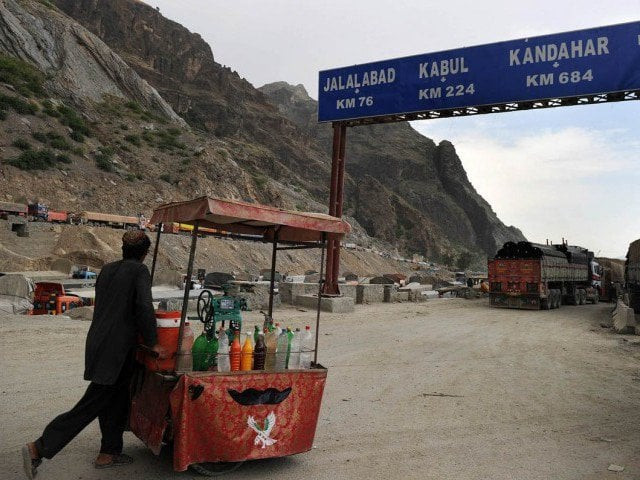Pakistan reopens border with Afghanistan
PM hopes Kabul will address the reasons that triggered border closure soil

A file photo of Pak-Afghan border. PHOTO: AFP
Prime Minister Nawaz Sharif took the decision on Monday ‘as a goodwill gesture’ and hoped the Afghan government would take steps required to address ‘the reasons’ that triggered the border closure.
The border crossings between the two hyphenated neighbours were closed on February 16 following a string of deadly bombings killed and maimed dozens of people across the country. Pakistani officials say Jamaatul Ahrar – the group that claimed credit for the grisly violence – is operating from safe havens in Afghanistan.
The border closure left hundreds of thousands of people and container trucks loaded with trade goods to Afghanistan stranded at the two major crossings of Torkham and Chaman.
Afghan envoy urges PM Nawaz to reopen Pak-Afghan border
“We have taken this decision on humanitarian grounds,” Premier Sharif said in a statement issued from his office. Interestingly, he minced no words in stating that the recent terrorist attacks in Pakistan were being traced back to the sanctuaries of militants in Afghanistan. Notwithstanding he ordered reopening of the border citing ‘centuries-old’ religious, cultural and historic links.
“Despite the fact that those involved in terrorist activities in Pakistan have a connection with anti-Pakistan elements in Afghanistan, the closure of the border between the two countries, having centuries old religious, cultural and historic relations, is against the economic and public interests,” he said in the statement.
“It has been decided to reopen the border as a goodwill gesture with immediate effect, with the hope that the government of Afghanistan will take the necessary steps, required to address the reasons that led to the closure of the border.”
The development came after representatives of the two countries held the highest-level face-to-face discussion on cross-border terrorism in London last week.
Prime Minister’s Adviser on Foreign Affairs Sartaj Aziz had met Afghanistan’s National Security Adviser Hanif Atmar and lodged complaints that Afghan-based militants had been mounting attacks on the Pakistani soil.
It seems the interaction eventually bore fruit and the two neighbours decided to move forward. As a first step in this direction, the government decided to facilitate people-to-people contacts by reopening the border crossings.
This was also corroborated by Afghan Ambassador Omar Zakhilwal’s comments who said Pakistan has ‘unconditionally’ opened the border in accordance with the steps agreed upon during last week’s high-level talks in London.
“[Adviser] Sartaj Aziz has assured me that the border is scheduled to be permanently opened on Monday in line with the understanding reached at London,” Zakhilwal said. “We have pursued the implementation process of the agreement [reached] on the reopening of the border and other important issues over the past three days,” he wrote on his official Facebook page. He didn’t explain ‘other important issues’.
The Express Tribune has learnt that Aziz and Atmar also talked about the lists of wanted people that the two countries had exchanged last month.
Tensions along the frontier have been simmering for months, after hundreds of thousands of Afghan refugees in Pakistan had been repatriated last year.
The government attempts to control the previously open border and implement customs duties have also sparked complaints from traders used to crossing with impunity.
Torkham and Chaman were briefly opened on March 7-8 by Pakistan to allow Pakistani and Afghan citizens who had valid travel documents to return home. About 50,000 Afghans took advantage of the move and crossed back into their country. About 6,000 or 7,000 Pakistanis travelled the other way.
A presidential spokesman in Kabul welcomed the Pakistani decision but reiterated that closing borders is not the way to address political issues between the two countries, the Voice of America reported.
Pakistan and Afghanistan share a 2,600-kilometer largely porous border, with five dedicated crossings for legal movements, including bilateral and transit trade convoys, transporting imported goods to the landlocked country from Karachi port on the Arabian Sea.
The protracted border closure has cost businesses on both sides tens of millions of dollars and fueled bilateral tensions. The abrupt move stranded thousands of trucks loaded with fresh fruits, vegetables, poultry and other food items, sharply increasing prices of imported goods in Afghanistan.



















COMMENTS
Comments are moderated and generally will be posted if they are on-topic and not abusive.
For more information, please see our Comments FAQ